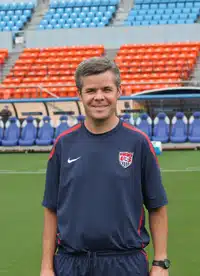
It’s not every day you meet a doctor who has the opportunity to combine his medical skills with his passion for sports, but Orthopaedic Associates of Central Maryland’s Scott Adams, MD, who specializes in sports medicine and orthopaedic surgery, is one of the lucky ones. As a team physician for the U.S. Women’s National Soccer Teams, Dr. Adams recently traveled to Portugal as the team physician with the full Women’s Team as well as to Japan for the U20 Women’s World Cup.
“I played soccer my whole life, so when I learned that there were physicians who worked with the U.S. men’s and women’s youth national soccer teams, I made it a goal of mine to get involved,” explains Dr. Adams. His first exposure to being a team doctor was traveling with the women’s youth soccer team to Spain. This was a stepping stone to becoming involved with the U20 U.S. women’s youth World Cup in Japan and the U.S. Olympic team in Portugal.
“It is always a great experience to be around world class soccer players and I am honored to be an orthopaedic surgeon with U.S. Soccer and the Women’s National Team,” says Dr. Adams. “I was most recently with the Women’s team in Portugal, where they won first place in a tournament against the best teams in the world.”
Serving as the team orthopaedic surgeon is sometimes filled with difficult decisions. “The toughest decision is determining whether or not an athlete can continue to play,” says Dr. Adams, who had to make some judgment calls during the World Cup in Japan. “Determining whether the players could continue to compete without further injuring themselves is very important.”
Overuse Injuries Common in Soccer
Dr. Adams explains that particularly with a sport like soccer, he sees a variety of overuse injuries including:
- Tendonitis in the Achilles and patella tendon
- Stress fractures, especially in younger athletes
- Acute injuries such as knee and ligament injuries and tears, including the common ACL (anterior cruciate ligament) injury
“Studies tell us that adolescent female soccer players have the highest rate of ACL injuries of any sporting population,” says Dr. Adams.
Injury Prevention is Key
As the team physician, Dr. Adams emphasizes injury prevention with the athletes and coaches, especially because of the ACL injuries that can sideline an athlete for months. In fact, Dr. Adams explains that FIFA, the governing body of soccer, has led the way with important injury prevention programs.
Such injury prevention programs focus on teaching players how to maintain proper muscle balance and build certain muscle groups as well as teach proper landing techniques. “Most ACL injuries are caused by non-contact situations and result from how players land after jumping or from pivoting and cutting to change direction,” adds Dr. Adams.
Important Injury Prevention Tips
- Make sure you have the proper equipment including properly fitted shin guards and shoes.
- Favorable field conditions – look at your surroundings and the equipment to make certain they are acceptable and safe.
- Warm up and cool down- Before a game, make sure to stretch and warm up the muscles; a cool down routine should include rehydrating the body.
- Address any injuries – Soccer is a demanding sport. Even minor injuries can become a chronic problem. Take care of injuries and seek medical treatment if there are any concerns.
- Take care of your body – stay hydrated and make sure you are getting the proper nutrition to maintain a strong body and good health.
His advice to soccer players at any level is – whether you’re an elite World Cup soccer player or a recreational player who only plays for fun on a Saturday morning, the strategies for injury prevention are the same.
And while he doesn’t play soccer as much as he’d like to these days since caring for his orthopaedic patients and the athletes, Dr. Adams stays involved with the sport he loves by participating with the youth teams from the medical standpoint. “It’s really been a great experience.”
Learn more about Dr. Scott Adams and the sports medicine program by visiting the Orthopaedic Associates of Central Maryland website at www.mdbonedocs.com or call 866-927-1338.

